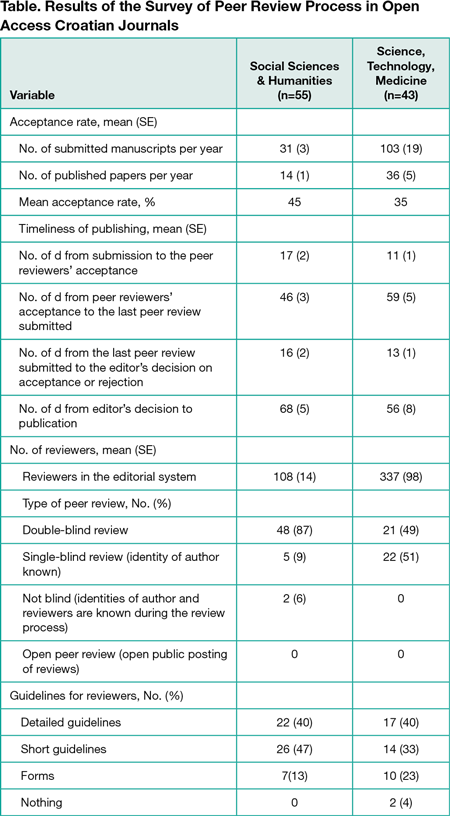Abstract
Peer Review in Croatian Open Access Scholarly and Professional Journals: A Cross-Disciplinary Survey
Ivana Hebrang Grgić,1 Jadranka Stojanovski2,3
Objective
The peer review process in Croatian open access journals was investigated to identify journal practices related to peer review and editors’ opinions on open peer review.
Design
An online questionnaire with 39 questions was sent by email to 441 journal editors from the Hrčak repository of Croatian open acess journals. We collected the data on discipline, acceptance rate, peer review type, guidelines for peer reviewers, number of reviewers in the editorial systems, duration of peer review process, ethical issues, and editorial freedom and integrity. The data was collected in February 2017.
Results
Ninety-eight editors responded (22%; 43 from science, technology, and medicine [STM] and 55 from social sciences and humanities [SSH]). According to the data from Hrčak repository, 217 of 441 journals use a peer review process. Only 1 response was from a journal that did not use peer review; thus, the editors of the 97 journals using peer review represent 45% of the Croatian open access journals that use peer review. Editors reported publishing 1130 retracted articles in their journals in the last 5 years (mean [SD], 12 [30] per journal), but the numbers provided cannot be verified because the Hrčak repository has only 11 retracted articles published by 9 journals in the same period. The mean journal acceptance rate is higher in SSH disciplines (45%) than in STM (36%) (Table
). The mean number of peer reviewers in editorial systems is higher in the fields of STM (336) than in SSH (107). Double-blind review is used by 87% (48) of SSH journals and 49% of STM journals. Detailed guidelines for reviewers are provided by 40% (22) STM journals and 40% (17) SSH journals. Other journals provide short guidelines or structured forms for the reviewers. Less than half of the journals address ethical issues, such as plagiarism or confidentiality, in their guidelines for reviewers. None of the journals use public posting of open peer reviews. Eighty-six percent of the STM editors and 80% of the SSH editors believe they have editorial freedom and integrity, and 11% and 14%, respectively, believe they do not.
Conclusions
These findings are limited by the low response rates and should be interpreted with caution. Peer review in Croatian open access journals represented by those editors who did respond lacks transparency and globally accepted standards. The concepts of open peer review are not well known to these editors. Croatian journals have a high level of editorial integrity, but there is a need to raise awareness of the importance of the transparent guidelines for the reviewers.
1University of Zagreb, Faculty of Humanities and Social Sciences, Department of Information and Communication Sciences, Zagreb, Croatia, ihgrgic@ffzg.hr; 2University of Zadar, Department of Information Science, Zadar, Croatia; 3Ruđer Bošković Institute, Bijenička, Zagreb, Croatia
Conflict of Interest Disclosures:
None reported.
Funding/Support:
None reported.

